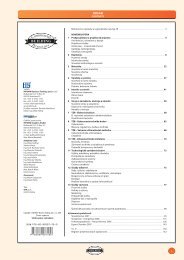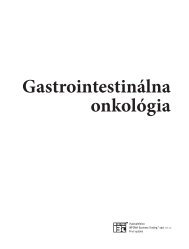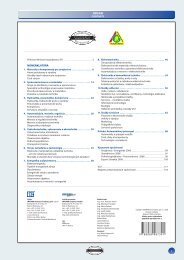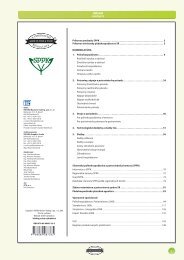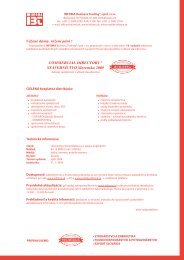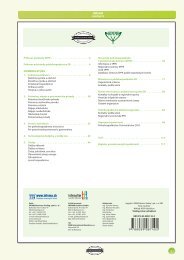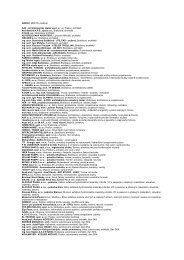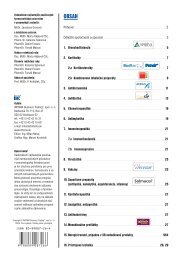OLD-SLAVONIC EMPIRE - INFOMA
OLD-SLAVONIC EMPIRE - INFOMA
OLD-SLAVONIC EMPIRE - INFOMA
Create successful ePaper yourself
Turn your PDF publications into a flip-book with our unique Google optimized e-Paper software.
50<br />
Slovak Agricultural<br />
and Food Chamber<br />
Záhradnícka, 21<br />
SK-811 07 Bratislava 1<br />
tel.: +421-2-5557 1003<br />
fax: +421-2-5556 4800<br />
e-mail: sppk@sppk.sk<br />
http://www.sppk.sk<br />
ADRESS BY THE PRESIDENT OF SAFC<br />
PRÍHOVOR PREZIDENTA SPPK<br />
Agri-food complex - and particularly within<br />
the agricultural primary production - fi nds<br />
itself in a particularly diffi cult situation. They<br />
have lost a balanced relationship between<br />
crop and animal production, there has been a<br />
collapse of sales prices of most commodities<br />
and agrarian core of existential threat to the<br />
very business of land. People in agriculture,<br />
including many executives are beginning to<br />
settle deep skepticism in our industry do not<br />
see any perspective. It is high time to stop the<br />
decline of agricultural sector and start saving.<br />
Essentially, we can say that our industry will be<br />
to try to save everything that can still save.<br />
There has problems almost all primary<br />
agricultural production, because it fails to<br />
adequately monetize their productions. In recent<br />
years, largely avoiding the accumulation of a<br />
price decline of most agrarian commodities<br />
than now. Although the dynamics of price<br />
trends for agricultural products in total almost<br />
always fall short of growth in input prices,<br />
appropriate restructuring of production and<br />
distribution business risk, these impacts can<br />
be mitigated at least partially. But now farmers<br />
do not have any “strong” commodity, for<br />
which they could be relied upon to stabilize its<br />
economy. Nothing to alter or slow the increase<br />
in purchase prices of raw cow’s milk, which<br />
recently started there. Their level is still not<br />
cover production costs only alleviates previous<br />
significant losses. Farmers expect better<br />
monetization of food grain and corn. Similarly,<br />
sales of feed grain to deliver the expected<br />
eff ects, although demand in the marketplace<br />
begins with a slightly refreshed. Neither the<br />
sale of slaughter pigs, cattle or poultry farmers<br />
are not cheering. Such an unfavorable situation<br />
in almost all commodities at the same time<br />
there has been a long time. We consider it our<br />
duty to warn, because many companies can<br />
bring to the current trend collapse.<br />
The solutions are clear. Our Chamber of them<br />
in a concise form the government raise already<br />
in April 2009. It is the utmost to mobilize all<br />
domestic resources and support to accelerate<br />
the fl ow of the primary agricultural production.<br />
We believe, however, that should wake up and<br />
Brussels, from which we expect more fl exible<br />
approaches to the preparation and running of<br />
the intervention system and other measures to<br />
eliminate the negative eff ects of natural market<br />
fl uctuations. Our analysis shows that, the annual<br />
production of commodities with signifi cant<br />
turbulence, in excess of 30% and between<br />
10-20% in comparison with long-term averages.<br />
Also it is necessary to revise the instruments of<br />
the Common Agricultural Policy, which in its<br />
current form fails to promote sustainable<br />
agricultural development. Fluctuations<br />
in revenue particularly in enterprises that<br />
operate in a weaker economic environment,<br />
which includes Slovakia, limiting the eff ective<br />
use of aid and mouth to reduce the creation<br />
of added value. The resulting system solution<br />
should maintain the utmost discretion market<br />
producers, consumers and storage agents, as<br />
are markets and reasonable standard. Interests<br />
of individual countries and across the EU would<br />
be the economic framework of the commodities<br />
markets were stable and not turbulent. Public<br />
resources and activities should be given to<br />
the word only if producers can not realize<br />
their goods during a period of a reasonable<br />
value added, namely those periods in which<br />
we currently fi nd themselves. Thought to be<br />
off setting the negative impact of severe price<br />
fl uctuations on producers. In the world there<br />
are already some systems, therefore we can not<br />
remain inactive.<br />
The biggest problem is the biological nature<br />
of agricultural production and its substantial<br />
dependence on weather and wind conditions.<br />
As climate change makes natural eff ects of<br />
growing less predictable, inherent volatility of<br />
agrarian markets will increase further. We believe<br />
that it must comply with new approaches to<br />
managing risks in agricultural production,<br />
which will always rotate more productive years<br />
to less fertile and should be in the interests of<br />
each company to know not only eliminate their<br />
impact on producers but also consumers.<br />
Regarding the EU, we are not satisfi ed with<br />
more concrete actions and proposals by the<br />
European Commission wants to apply the<br />
EU common agricultural policy. A concrete<br />
example is the reform of the sugar and milk<br />
are not delivering the expected eff ects and<br />
lead only to reduce production in the new<br />
member countries. Similarly, it is set in the<br />
reform of the wine market, which in turn limit<br />
its production in those countries that are the<br />
source of overproduction. We believe that<br />
the Commission should change the overall<br />
philosophy of its approach to agricultural policy<br />
and the move from the current defensive when<br />
trying to solve every problem in principle only<br />
by limiting production to more aggressive<br />
penetrations to third markets. Instead of<br />
abatement programs, in our view, should<br />
encourage reduction of production costs<br />
and increasing competitiveness of European<br />
productions worldwide. That is it, what we<br />
and our members in positions of Brussels very<br />
lacking.<br />
Ing. Milan SEMANČÍK<br />
President of the Slovak Agricultural and Food<br />
Chamber



